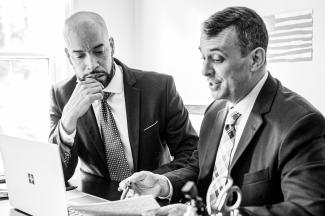
Jason Howell, CFP®, CPWA®, CSRIC® (left) and Doug Tees, MBA, CFP®, CAP® (right)
Letter to Stakeholders, July 2023
Thursday, July 6th, 10:02 am EST. One of the things I’ve learned while diving into the theory of financial advice is how both complex and simple it can be. Looking up at the markets on a holiday-shortened week highlights this reality. Your account is still up halfway through this year, despite recession forecasts. Predicting how interest rates, unemployment rates and inflation rates will affect the economy (and the stock market) has proven difficult. We’ve planned out your work (and play). You just need to “work your plan.”
How the World is Changing
The politics of the moment has turned its attention to so-called “ESG investing.” BlackRock’s CEO, Larry Fink has felt it necessary to disclaim the use of the word ESG “…because it has been misused by the far left and far right.” This is quite the concession from the CEO of the world’s largest asset manager who like me, likes to write letters to clients and the public. “When I write these letters, it was never meant to be a political statement…they were written to identify long-term issues to our long-term investors.” When it comes to sustainable investing, I couldn’t agree more. As quoted by the Sustainability Advisors Alliance, “Sustainable Investing isn’t about changing the world, it’s about understanding how the world is changing.”
As a firm, we never claim to do “ESG Investing.” For one reason, that’s not a “thing.” There is sustainable investing that uses underlying environmental, social and governance (ESG) factors to evaluate decisions. We proudly do that on your behalf. “ESG Investing” however is another phrase – like “Woke Capitalism” – reimagined by people who would prefer to divide our attention rather than focus it. In this way, the world is the same as it has always been. Cooler heads can prevail.
Plant-Based Innovation
Last week I had the pleasure of interviewing Elysabeth Alfano, CEO of Vegtech Invest. Our discussion opened my eyes and ears to the climate impact of our global food chain. She easily explained how plant-based innovation is cheaper and faster than replacing buildings or cars. Interested, take a listen here.
Tennis Anyone?
When I first started dating my wife, we spent entire Saturdays together. Often that included brunch and if it was on, professional tennis. We watched each of the “big 3” (male) tennis greats – Roger Federer, Novak Djokovic and Rada Nadal – and Serena Williams earn most of their 20+ grand slams titles over the past 19 years. We were watching in 2007 when both grand slam tournaments Wimbledon and the French Open equalized the prize money between men and women (the Australian Open did this in 2001 and the US Open in 1973). All of these tournaments are doing better than ever.
What caught my attention this season is the return of Grand Slam Champion and former World #1 player, Caroline Wozniacki. She retired in 2020 and since then has had two kids. For too long, having children seemed to be the end of professional athletics for women. All-time great tennis superstar Serena Williams came back after having her first child but retired last year after a long illustrious career. Lindsay Davenport also returned – and won! – after two kiddos but then immediately retired. What’s different about the return of Caroline Wozniacki and the eminent return of Naomi Osaka is their confidence in taking a family break and returning, earlier in their careers. No need to put off family until after “retirement,” just incorporate your family goals like men always have. I have fathered two daughters. I want them to be, do and have whatever life will afford them. I’m glad to see that the world (and the mindset) is changing in this way and am happy to support a sport that’s a big part of it.
The Championships, Wimbledon are under way. Watch when you can.
Jason J. Howell, CFP®, CPWA®, CSRIC®
President
Jason Howell Company is an independent, family wealth management firm that believes in empowering people to overcome financial imposter syndrome.
Jason J. Howell, CFP®, CPWA®, CSRIC® and Douglas W. Tees, MBA, CFP® have spent a lot of time in the Washington, DC area, and are aware that many people who are first generation wealth suffer from a kind of "financial imposter syndrome." Successful entrepreneurs are always looking over their shoulder; government contractors worry about the next contract; former Capitol Hill staffers privately wonder if they should "feel bad" for the money they now make. Imposter syndrome is common among people who work for the many corporate headquarters based in this area as well. These feelings get in the way of properly managing wealth. We empower them to get organized, build a team of advisors and make decisions.
Our typical "first generation wealth" families include dual income parents who work, save and have just the right amount of fun. They trend a little older - Baby Boomers (born 1946 - 1964) and Gen-Xers (born 1965 - 1980) - but we're starting to see more Millennials (born 1981 to 1996) who don't want to wait until it's too late. They earn impressive incomes and have accumulated a good bit of savings. As bona fide experts themselves, they expect fiduciary expertise from people they hire. They are just not sure about the "big box" brokerage firms that advertise one thing and seem to do another.
First generation wealth accumulators realize that they:
- Need to “do something” with the cash in their checking/savings
- Need an investment strategy for “up” and “down” markets
- Need a plan to mitigate market, credit, inflation, and political risks
- Need to start tax planning instead of just tax paying
- Need to be sure they are choosing the right work benefits
- Need to reduce financial miscommunications between partners
- Need to separate business finances from personal finances
- Need to plan for money while alive and for what happens after death

